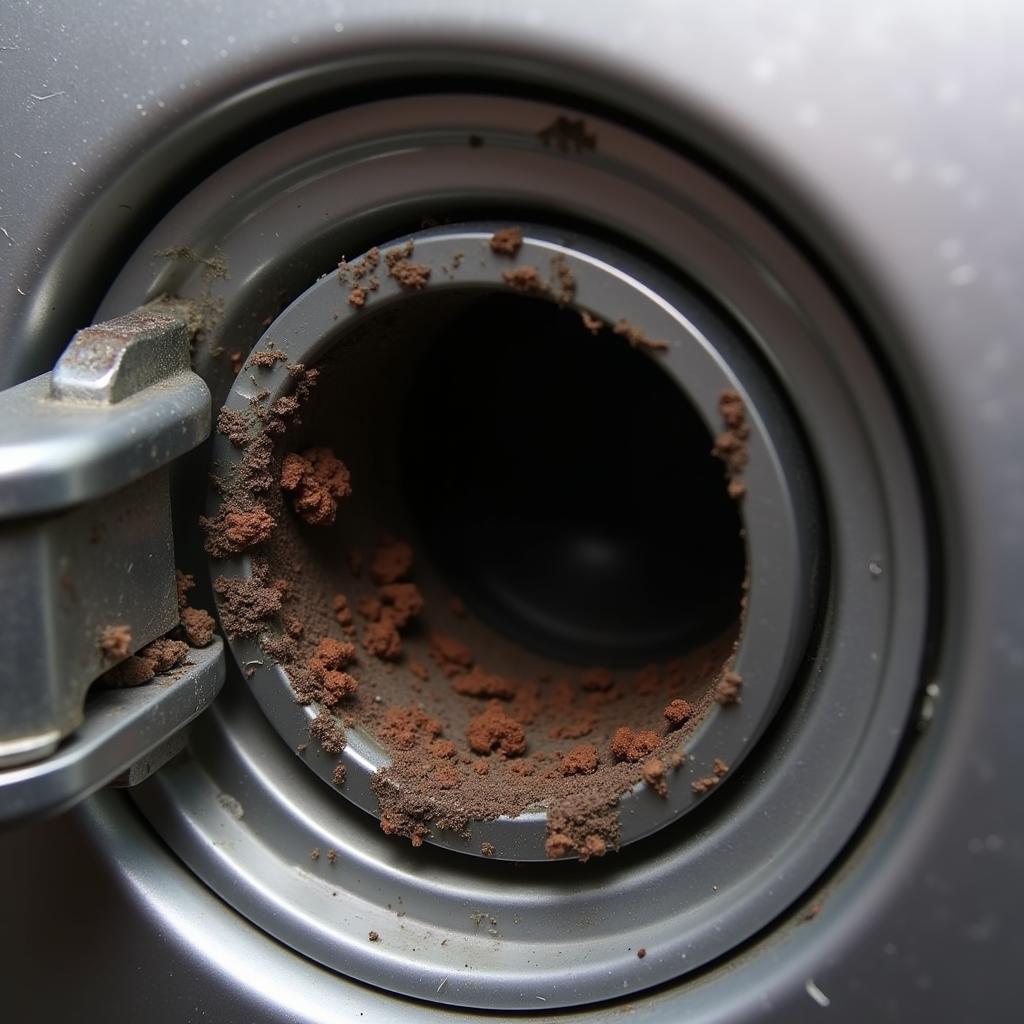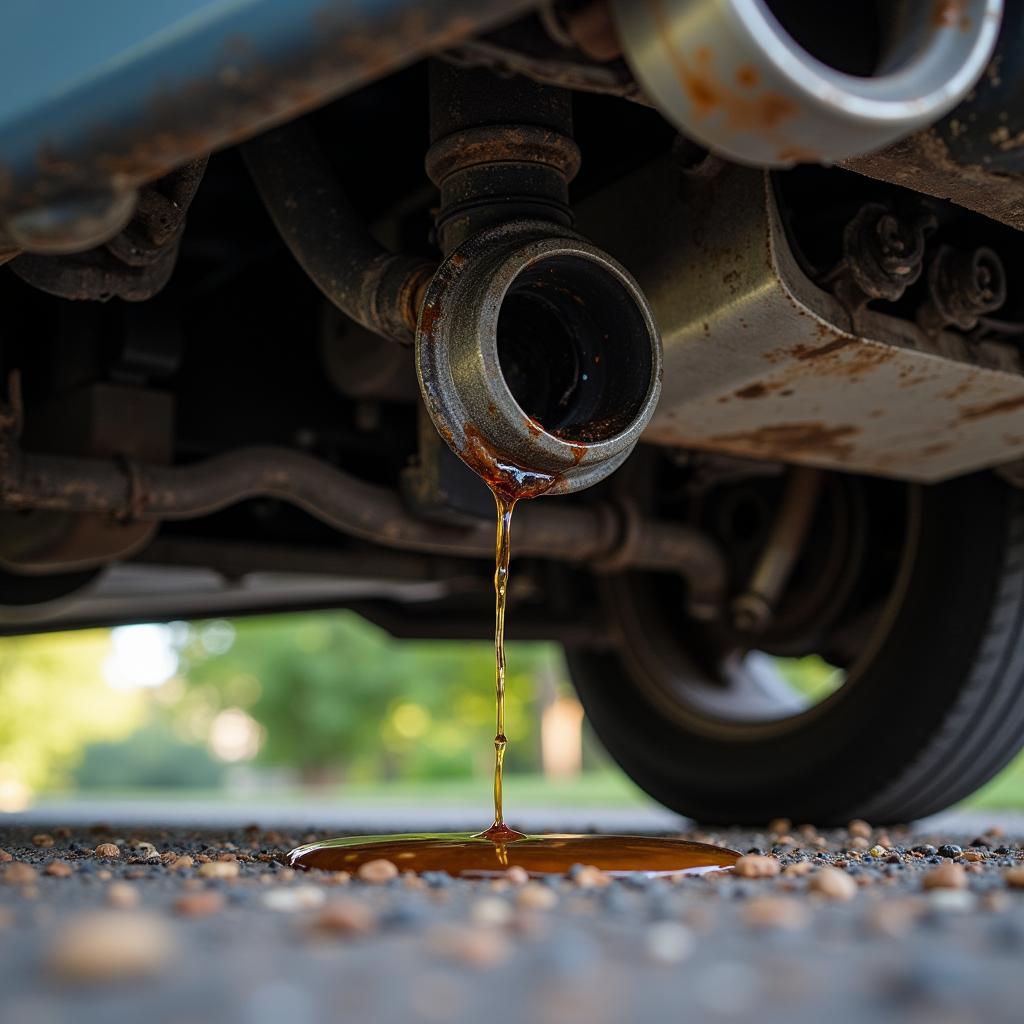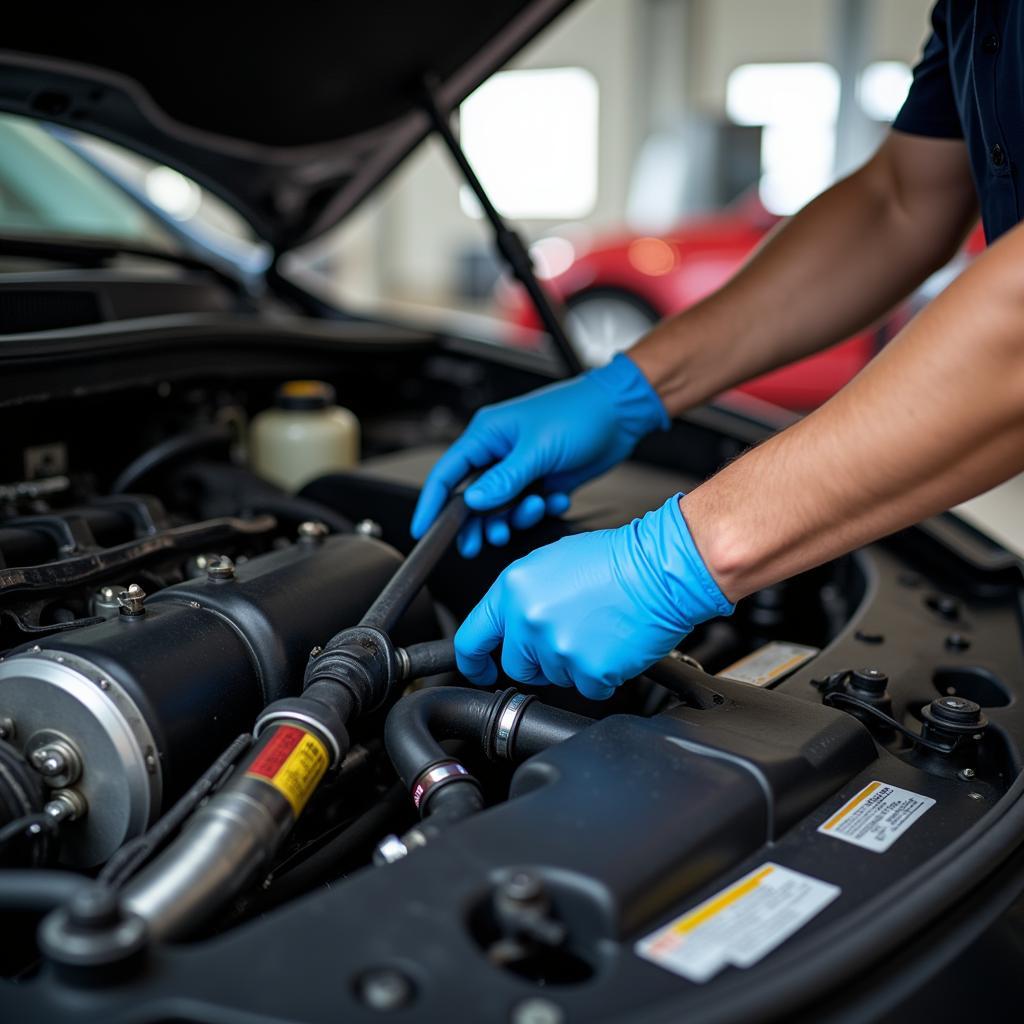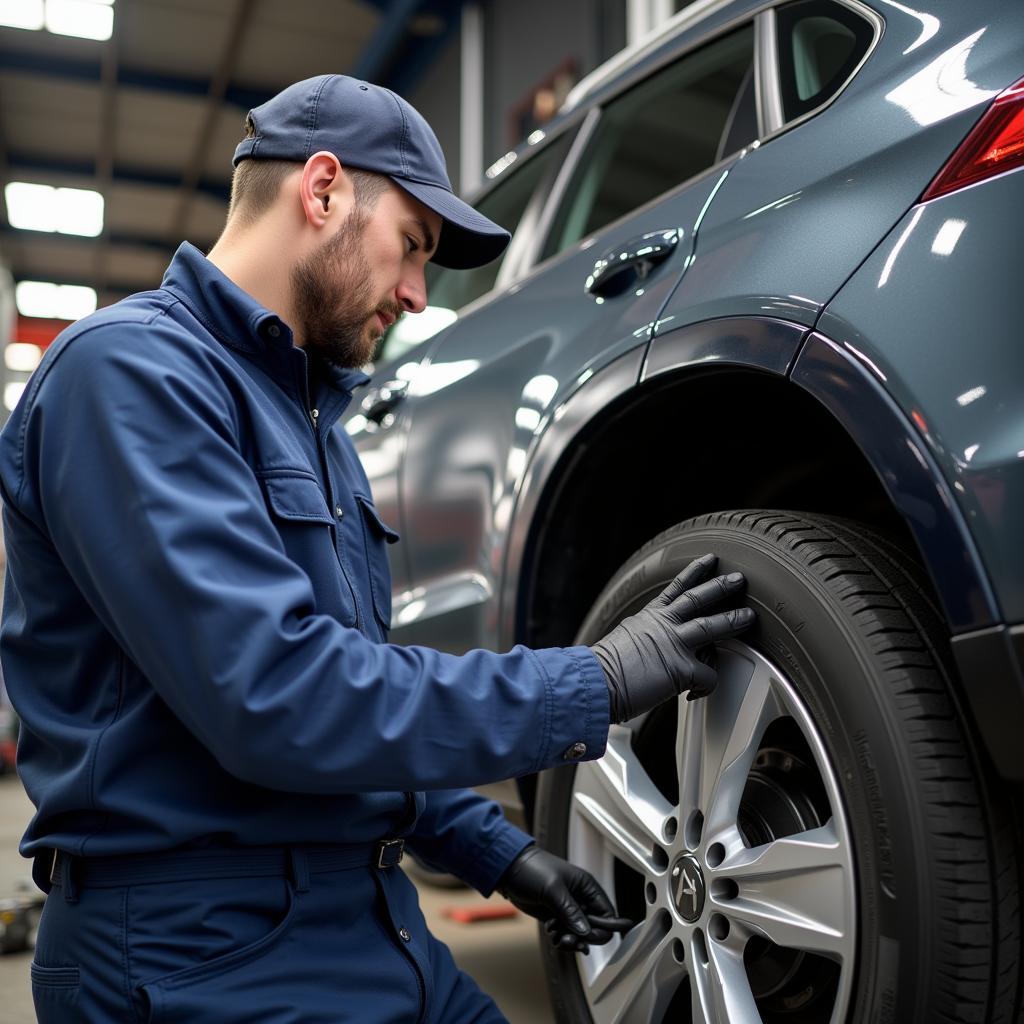Common Car Refueling Problems: A Comprehensive Guide
Refueling your car should be a simple process, but sometimes it can be fraught with issues that leave you frustrated and stranded. Whether you’re a car owner, mechanic, or technician, understanding common refueling problems is crucial for smooth operation and peace of mind.
This comprehensive guide will delve into the most frequent Car Refueling Problems, their root causes, and effective troubleshooting steps to get you back on the road quickly.
Common Car Refueling Problems
Let’s explore some of the most common refueling problems that car owners encounter:
1. Fuel Tank Won’t Accept Fuel
This is one of the most frustrating refueling issues. A fuel tank that refuses to accept fuel can be caused by several factors:
- Clogged Fuel Filler Neck: The fuel filler neck is the tube that connects the fuel tank to the outside. Debris, dirt, or a buildup of fuel vapors can clog it, preventing fuel from entering the tank.
- Faulty Fuel Tank Vent: The fuel tank vent allows air to enter the tank as fuel is dispensed, preventing a vacuum from forming. A blocked or damaged vent can create a pressure imbalance, making refueling impossible.
- Obstructed Fuel Line: Although less common, an obstructed fuel line connecting the filler neck to the fuel tank can also prevent fuel from flowing. This could be due to a kink, damage, or foreign object obstructing the line.
- Incorrect Fuel Type: If you’re using the wrong type of fuel (e.g., using diesel in a gasoline engine), you might encounter problems as the fuel might not be compatible with your engine.
 Clogged Fuel Filler Neck
Clogged Fuel Filler Neck
2. Fuel Gauge Issues
Sometimes, the fuel gauge may not accurately reflect the amount of fuel in the tank. These problems can arise due to:
- Faulty Fuel Gauge Sender: The fuel gauge sender is a sensor that measures the fuel level in the tank and sends a signal to the gauge. A faulty sender can provide inaccurate readings.
- Electrical Problems: Electrical issues in the wiring between the fuel gauge sender and the gauge itself can also lead to inaccurate readings.
- Floating Debris in the Fuel Tank: If there’s floating debris in the fuel tank, it can interfere with the fuel gauge sender, causing inaccurate readings.
3. Fuel Tank Leak
A leaking fuel tank is a serious issue that should be addressed immediately. Leaking fuel can be dangerous, polluting the environment, and creating a fire hazard.
- Damaged Tank: The fuel tank itself could be damaged due to corrosion, impact, or age, leading to leaks.
- Failed Fuel Line: A leaking fuel line connecting the tank to the engine or fuel pump can cause fuel to spill.
- Loose or Damaged Fuel Filler Neck: A loose or damaged fuel filler neck can also allow fuel to leak.
 Leaking Fuel Tank
Leaking Fuel Tank
Troubleshooting Car Refueling Problems
Here’s a step-by-step guide to troubleshoot common car refueling problems:
1. Fuel Tank Won’t Accept Fuel
- Check the Fuel Filler Neck: Carefully inspect the fuel filler neck for any visible obstructions like debris, dirt, or a buildup of fuel vapors. If necessary, use a soft brush or a small vacuum cleaner to remove any debris.
- Verify Fuel Tank Vent: Check if the fuel tank vent is open and unobstructed. A blocked or damaged vent should be replaced.
- Examine Fuel Lines: Inspect the fuel lines connecting the filler neck to the fuel tank for any kinks, damage, or blockages.
- Ensure Correct Fuel Type: Double-check that you’re using the correct fuel type for your vehicle.
2. Fuel Gauge Issues
- Check Fuel Gauge Sender: If possible, remove the fuel gauge sender unit from the fuel tank and inspect it for damage or corrosion. You can also test the sender using a multimeter to see if it’s working properly.
- Inspect Electrical Wiring: Check the wiring connecting the fuel gauge sender to the gauge for any breaks, damage, or corrosion.
- Address Debris in the Fuel Tank: If you suspect debris in the fuel tank, you may need to have it professionally cleaned.
3. Fuel Tank Leak
- Locate the Leak: Inspect the fuel tank, fuel lines, and fuel filler neck for any visible leaks.
- Tighten Connections: Check and tighten all fuel line connections to ensure they are secure.
- Professional Repair: If the leak is persistent, you’ll need to take your car to a qualified mechanic for professional repair or tank replacement.
 Mechanic Inspecting Fuel Lines
Mechanic Inspecting Fuel Lines
Preventative Maintenance for Refueling Systems
Regular preventative maintenance can help prevent common refueling problems and keep your fuel system running smoothly.
- Clean the Fuel Filler Neck: Periodically clean the fuel filler neck with a soft brush or vacuum to remove debris and prevent clogging.
- Inspect Fuel Lines: Regularly check fuel lines for any signs of wear, damage, or leaks.
- Check Fuel Tank Vent: Ensure the fuel tank vent is open and unobstructed to prevent pressure buildup.
- Use the Correct Fuel Type: Always use the recommended fuel type for your vehicle.
Tips for a Smooth Refueling Experience
Here are some practical tips for a smoother refueling experience:
- Park Straight: Align your car straight with the fuel pump to make fueling easier and prevent spills.
- Avoid Overfilling: Don’t overfill the tank, as this can cause fuel to spill and create a fire hazard.
- Check for Leaks: Always check for any leaks after refueling.
- Replace Fuel Cap: Securely replace the fuel cap after refueling to prevent fuel vapors from escaping.
Conclusion
Car refueling problems can be frustrating and inconvenient, but understanding the common causes and implementing effective troubleshooting steps can help get you back on the road quickly. Regular preventative maintenance is key to keeping your fuel system running smoothly and preventing potential issues. If you’re facing persistent or severe refueling problems, always consult a qualified mechanic for professional diagnosis and repair.
Remember, fuel tank leaks are a safety hazard and should be addressed promptly.
“A properly maintained fuel system is crucial for efficient engine performance and safety. Regular inspections and preventative maintenance can save you time, money, and potential headaches.”
– John Smith, Certified Automotive Technician
“Don’t hesitate to reach out to a qualified mechanic if you’re experiencing any refueling problems. A professional diagnosis can prevent further damage and ensure the safety of your vehicle and yourself.”
– Mary Jones, Automotive Specialist
For additional support or to learn more about car refueling problems, contact AutoTipPro at:
+1 (641) 206-8880
500 N St Mary’s St, San Antonio, TX 78205, United States
FAQ
Q: Why is my car not filling up with gas?
A: There are several reasons why your car might not be filling up with gas, including a clogged fuel filler neck, a faulty fuel tank vent, or an obstructed fuel line.
Q: What causes a fuel gauge to be inaccurate?
A: An inaccurate fuel gauge can be caused by a faulty fuel gauge sender, electrical problems, or debris in the fuel tank.
Q: What should I do if I find a fuel leak?
A: If you find a fuel leak, immediately stop driving and contact a qualified mechanic for professional repair.
Q: How can I prevent refueling problems?
A: Regular preventative maintenance, like cleaning the fuel filler neck, inspecting fuel lines, and using the correct fuel type, can help prevent refueling problems.
Q: Should I be concerned if my car is hard to fill up?
A: If you’re experiencing difficulty refueling, it’s important to address the issue as soon as possible. It could indicate a problem with your fuel tank or fuel system that needs attention.





Leave a Reply